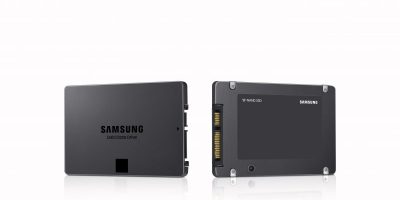Consumer SSD is first available four-bit drive, says Samsung
Claimed to be the industry’s first four-bit (QLC, quad-level cell) four-Tbyte SATA solid-state drive (SSD) for consumers, the QLC SATA SSD is available from Samsung Electronics.
Based on one-Tbit V-NAND with performance equivalent to the company’s three3-bit design, Samsung’s QLC SSD is expected to boost memory in smartphones with high capacity for memory storage.
According to Jaesoo Han, executive vice president of memory sales and marketing at Samsung Electronics, the SATA SSD will “herald a massive move to terabyte-SSDs for consumers”. He added: “As we expand our line-up across consumer segments and to the enterprise [sector], four-bit Tbyte-SSD products will rapidly spread throughout the entire market.”
The one-Tbit, four-bit V-NAND chip will enable Samsung to efficiently produce a 128-Gbyte memory card for smartphones, leading to higher capacities for high-performance memory storage.
Typically, as data stored within a memory cell increases from three bits to four, the chip capacity per unit area would rise and the electrical charge (used to determine information from a sensor) would decrease by as much as 50 per cent, making it considerably more difficult to maintain a device’s desired performance and speed, explains Samsung.
However, the four-bit four-Tbyte QLC SATA SSD is claimed to maintain its performance levels at the same level as a three-bit SSD, by using a three-bit SSD controller and TurboWrite technology, while increasing drive capacity through the use of 32 chips, all based on 64-layer fourth-generation one-Tbit V-NAND.
The four-bit QLC SSD enables a sequential read speed of 540-Mbytes per second and a sequential write speed of 520Mbytes per second, and comes with a three-year warranty.
Samsung plans to introduce several four-bit consumer SSDs later this year with one-, two- and four-Tbyte capacities in the widely used 2.5-inch form factor.
In addition, the company expects to provide M.2 NVMe SSDs for the enterprise market this year and begin mass production of four-bit fifth-generation V-NAND to expand its SSD lineup to meet the growing demand for faster, more reliable performance across next-generation data centres, enterprise servers, and enterprise storage.
http://www.samsung.com/semiconductor




